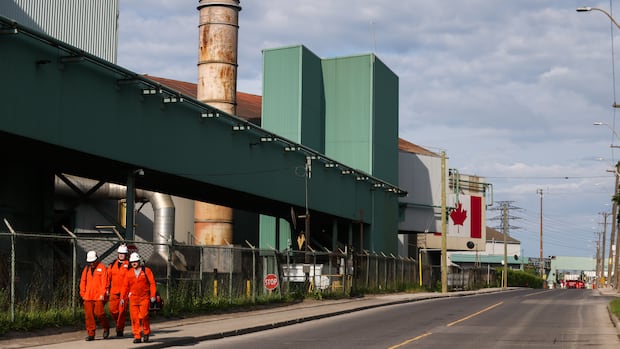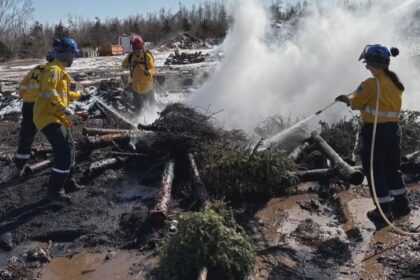PoliticsPrime Minister Mark Carney announced Wednesday afternoon a suite of new measures to help Canada’s steel and lumber sectors that have been battered by U.S. tariffs, including financial assistance and tightening up the Canadian market from foreign products.Industries hit hard by U.S. sectoral tariffsListen to this articleEstimated 5 minutesThe audio version of this article is generated by text-to-speech, a technology based on artificial intelligence.Workers leave ArcelorMittal Dofasco’s steel mill on June 9 in Hamilton. Prime Minister Mark Carney announced new supports for the steel industry on Wednesday. (Cole Burston/Getty Images)Prime Minister Mark Carney announced a suite of new measures to help Canada’s steel and lumber sectors that have been battered by U.S. tariffs, including financial assistance and tightening up the Canadian market from foreign products.According to a press release from Carney’s office, the federal government is taking a swing at foreign steel imports from countries that have a free trade agreement with Canada as well as countries which do not.For countries without a free trade agreement, Canada is tightening their tariff rate quotas for steel products from 50 per cent to 20 per cent of 2024 levels.A tariff-rate quota refers to a limit on the quantity of a product that can be imported at a lower duty. In other words, countries that don’t have a free trade agreement with Canada can bring in less steel at lower tariff rates.During a news conference on Wednesday afternoon, Carney said the move could open up more than $850 million in domestic demand for Canadian steel.WATCH | Carney announces steel, lumber supports:Carney announces supports for steel and lumber sectors hard hit by U.S. tariffsPrime Minister Mark Carney announced new measures to help the steel and lumber sectors, aiming to limit foreign imports in order to increase domestic production and use. Carney said the new measures will empower Canadian workers and businesses to adapt to the new global landscape. For countries that have a free trade agreement with Canada — but excluding the United States and Mexico — the federal government is reducing their quotas for steel products from 100 per cent to 75 per cent of 2024 levels.During a technical briefing for reporters before the announcement, an official from the federal government said tightening quotas rather than levelling a straight tariff helps Canadian companies transition away from foreign steel while ensuring some supply still comes in.The federal government also announced it will end the temporary remission of Canadian tariffs on imports for steel used in Canada for manufacturing, food and beverage packaging and agricultural production.That temporary remission will end on Jan. 31, 2026, according to the press release.Catherine Cobden, president and CEO of the Canadian Steel Producers Association, said in an interview on CBC’s Power & Politics the new measures give the steel industry “a fighting chance” in the trade war with the United States.Cobden said her group “makes most of what Canada needs” and there’s now an opportunity to make up ground that’s been lost.”We’re in a way better place today than we were yesterday,” she said.Lumber supports, freight rate subsidyFor months, provinces like British Columbia and New Brunswick have been calling on Ottawa to provide more support for their softwood lumber industries, which are currently struggling in the face of a 45 per cent tariff imposed by U.S. President Donald Trump.Now, Canada will earmark $500 million in funding under the large enterprise tariff loan facility to support lumber firms facing liquidity pressures, the press release said.The federal government is also providing an additional $500 million to the Business Development Bank of Canada’s softwood lumber guarantee program and establishing a single window for companies to submit applications to support programs.WATCH | B.C. Premier David Eby calls for support from Ottawa:B.C. premier calls on Ottawa to treat lumber tariffs as national emergencyB.C. Premier David Eby says Canadian lumber now faces higher tariffs going into the U.S. than lumber from Russia, and the higher tariffs going into effect must be treated by Ottawa like a national emergency. In August, the federal government announced $1.2 billion in federal support for the softwood lumber industry. CBC News has reached out to several government departments to clarify if those supports have been distributed yet.According to the press release, the federal government is also pushing railway companies to cut freight rates for transporting Canadian steel and lumber interprovincially by 50 per cent, beginning in the spring.Carney said the federal government will achieve this goal by sending funding to Canadian National Railway and Canadian Pacific Kansas City. A government official at the technical briefing estimated the cost will be about $146 million for one year.Derek Nighbor, president and CEO of the Forest Products Association of Canada, said the announcement is positive and he believes the federal government understand the urgency of the issue.”The key now is through program design and structure — get the money out the door,” Nighbor said. “The additional funding is welcome today, the focus now is execution and that’s the piece we’ll be holding the government to account.”Tariffs and turmoilThe country’s steel and aluminum producers have been caught in the crosshairs of trade tensions between Washington and Ottawa this year.Trump slapped 25 per cent tariffs on Canadian steel and aluminum in March, then doubled those tariffs to 50 per cent in June.WATCH | Trump calls off trade talks with Canada over Ontario anti-tariff advertisement:Trump says all trade negotiations with Canada are terminatedU.S. President Donald Trump says that all trade talks with Canada are terminated in a post on his Truth Social platform. He cited a complaint by the Ronald Reagan Presidential Foundation & Institute about a ‘selective’ clip of Reagan talking about tariffs in an ad by the Government of Ontario.More recently, Trump abruptly called off all trade talks with Canada, noting his displeasure with an ad from the Ontario government that used president Ronald Reagan’s own words to spread an anti-tariff message to an American audience.Trump said Carney subsequently apologized to him about the ad. Despite that, talks with the U.S. still haven’t been “revived,” Carney told reporters earlier this month.ABOUT THE AUTHORBenjamin Lopez Steven is an associate producer for CBC’s The House and a digital writer with CBC Politics. He was also a 2024 Joan Donaldson Scholar and a graduate of Carleton University. You can reach him at benjamin.steven@cbc.ca or find him on Twitter at @bensteven_s.Follow Ben on BlueskyFollow Ben on XWith files from Marina von Stackelberg
Wednesday, 4 Mar 2026
Canada – The Illusion
Search
Have an existing account?
Sign In
© 2022 Foxiz News Network. Ruby Design Company. All Rights Reserved.
You May also Like
- More News:
- history
- Standing Bear Network
- John Gonzalez
- ᐊᔭᐦᑊ ayahp — It happened
- Creation
- Beneath the Water
- Olympic gold medal
- Jim Thorpe
- type O blood
- the bringer of life
- Raven
- Wás’agi
- NoiseCat
- 'Sugarcane'
- The rivers still sing
- ᑲᓂᐸᐏᐟ ᒪᐢᑿ
- ᐅᑳᐤ okâw — We remember
- ᐊᓂᓈᐯᐃᐧᐣ aninâpêwin — Truth
- This is what it means to be human.
- Nokoma











